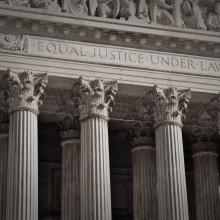culture wars
When I spoke over video call with CEO and editor-in-chief Jason Woodruff in June, he told me that The Pour Over was founded out of “a lack of better options.”
“Traditional news sources promote obsession, they promote anger, they promote division,” the 28-year-old Iowa resident told Sojourners. “That’s why people either become shaped by those [divisions], or they flee and they become uninformed.”
Branded as a “politically neutral” and “trustworthy news source,” The Pour Over is Woodruff’s answer for Christians looking for facts without the spin. It’s a publication that doesn’t take sides and offers a brief biblical encouragement at the end of each story. It highlights the day’s biggest news, approximately takes five minutes to read, and is purportedly punchy.
IT MEANS A LOT to Jack Teter that Christians are getting involved in the fight for better sex education. “A lot of folks in my generation got shame-based sex ed,” said Teter, the regional director of government affairs for Planned Parenthood of the Rocky Mountains. “So, it’s really cool to see these groups talking about the morals of consent, love, and communication.”
For Candace Woods, it’s a spiritual issue. Woods, who is in the ordination process with the United Church of Christ and a facilitator for the Our Whole Lives sex education curriculum developed by the UCC and the Unitarian Universalist Association, was brought up in so-called purity culture, and the most guidance she had from her church and community growing up was “Don’t have sex.” As a consequence, when she married a man 14 years her senior, she said that she “was very unprepared for a sexual relationship.”
As that relationship was ending in divorce, Woods encountered the Our Whole Lives curriculum through a UCC congregation. That curriculum, which is written for secular as well as faith-based education for kindergarteners through adults, emphasizes self-worth, responsibility, sexual health, justice, and inclusivity—values Woods held spiritually but until then had never heard applied to sexuality. “I found myself being incredibly healed by this work,” Woods told Sojourners, and as a result she has felt called to advocate for more kids to have access to curricula such as Our Whole Lives.
Woods joined others in advocating for Colorado’s HB19-1032, which made a minor adjustment to an existing law: It added teaching of consent as an “affirmative, unambiguous, voluntary, continuous, knowing agreement between all participants in each physical act within the course of a sexual encounter or interpersonal relationship.” Among those advocating for the bill was the Denver-based racial justice nonprofit Soul 2 Soul Sisters. According to Briana Simmons, who coordinates the “Black Women’s Healing, Health, and Joy” program for the organization, comprehensive sex education provides information that is vital to bodily autonomy, an important value in Womanist faith traditions, Christian and otherwise. “We can only make the best decision for ourselves if we have the most accurate and comprehensive information,” Simmons said. “At that point, we can consult with whomever we trust, be that a faith leader or a higher power, as we make those decisions for ourselves.”
The bill ultimately passed, but Colorado, like many states, has felt the push and pull between progressive and conservative political movements in the past year. After the racial reckonings of 2020, when millions of Americans participated in Black Lives Matter marches and online campaigns, 2021 saw a profusion of legislation proposed and passed to prevent schools from teaching about systemic racism. In many cases, sex education follows the same rhythm. Teter has seen pushback in the form of “bad faith” bills used mostly by conservative lawmakers to voice opposition to recent progress. For instance, one bill called for high-definition footage of a human embryo to be shown during sex education classes, ostensibly to discourage abortion. But such footage doesn’t exist, Teter said, and such “off-the-cuff bills” have little chance of going anywhere. On the whole, Teter said, comprehensive sex education is “in a good spot” in Colorado.
That’s not the case everywhere.

Bishop Karen Oliveto. Image via Patrick Scriven / United Methodist Church PNW Conference / RNS
Bishop Karen Oliveto felt called to ministry in the United Methodist Church when she was 11 years old.
But for years Oliveto refused to allow her name to be cast for the role of bishop because she “didn’t want to harm the church,” she said.

Brandon Bourdages / Shutterstock
PROVIDING A definition of religious freedom is fairly easy: Every human person has a right to believe, to pray, to worship in community, and to practice her faith according to her conscience. And it’s just as easy to get Americans to agree that religious freedom is an important, even crucial, element of a healthy society. But ask what it means to respect this human right and where it’s being violated, and you quickly find yourself in the weeds of rancorous debate.
On the one hand, conservative Christians have raised religious freedom alarms in the U.S. Television personalities David and Jason Benham, for instance, cite such concerns in their objections to ordinances allowing transgender people to use bathrooms that correspond with the gender with which they identify; a National Review columnist wrote that such policies “would render religious liberty permanently subordinate to the interests and demands of LGBT activists.”
Does sharing a bathroom with a transgendered person infringe upon the consciences of those who consider transgender identity a threat? And even if it does, does the state’s role in protecting the rights and dignity of all citizens sharply relativize this concern? Are the questions perhaps more complex than our binary culture wars suggest?
Or consider: For five years, critics of the mandate of contraceptive coverage by employer health plans under the Affordable Care Act have insisted that the policy violates religious freedom. Several businesses and organizations—Hobby Lobby, the Little Sisters of the Poor, and more—have sued the federal government on the point. And despite its decades-long advocacy of universal health coverage, the U.S. bishops’ conference initiated an annual “Fortnight for Freedom” observance that even some allies find inappropriately partisan.
Some who gnash their teeth over these issues seem unconcerned about other offenses to religious freedom. They said little, for example, about state government efforts to interfere with Christian ministry to migrants and refugees. Indiana Gov. Mike Pence not only withdrew his state’s help to Syrian refugees trying to escape a historic humanitarian crisis, he also tried to convince the archdiocese of Indianapolis to cease its ministry to them.

Photo via Lightspring / Shutterstock.com
The culture wars have always been with us. Conservatives start them. And liberals win them. So argues Stephen Prothero in his new book Why Liberals Win the Culture Wars (Even When They Lose Elections).
Prothero recently spoke with Sojourners about this argument, its impact on liberal activism, and how we can better wage the culture wars. This interview has been edited for length and clarity.

Man typing on a tablet, guteksk7 / Shutterstock.com
Like many things — theological beliefs, worships styles, forms of baptism, and preferred interpretations of the Bible — Christians are divided when it comes to which social justice issues, culture wars, and current events are worth supporting and condemning or even talking about.
Followers of Christ can be against gay marriage or for it, Democrat or Republican, a pacifist or a soldier, a vegan or a meat-eater, an animal rights advocate or a hunter — Christians constantly contradict one another, and that’s OK.
From Ava DuVernay’s award-winning film to President Obama’s speech at the Edmund Pettus Bridge, America has remembered Selma this year. We have honored grass-roots leaders, acknowledged the sacrifices of civil rights workers and celebrated the great achievement of the Voting Rights Act. At the same time, we have recalled the hatred and fear of white supremacy in 1960s Alabama. But we may not have looked closely enough at this ugly history.
Even as we celebrate one of America’s great strides toward freedom, the ugliest ghosts of our past haunt us in today’s “religious freedom” laws.
Many able commentators have pointed out the problem of laws that purport to protect a First Amendment right to religious freedom by creating an opportunity to violate other people’s 14th Amendment right to equal protection under the law. But little attention has been paid to the struggle from which the 14th Amendment was born — a struggle that played out in Selma 50 years ago and is very much alive in America’s statehouses today.
We cannot understand the new religious freedom law in Indiana and others like it apart from the highly sexualized backlash against America’s first two Reconstructions.
On my recent 4,100-mile pilgrimage across the U.S., I occasionally used my radio’s “seek” function to find stations.
I often stopped on a “Christian radio” station, sometimes a national network such as American Family Radio, sometimes a local effort featuring preachers from area churches, always conservative.
I did so because I enjoy gospel music and I was curious what the radio preachers were saying.
They tended to be excellent speakers and well-prepared. But their message seemed frozen in time, as if nothing had changed in America since the 1950s except for the identities of enemies who are allegedly “attacking Christians,” "attacking Christian values” and “attacking the American way of life.”
This siege mentality seemed basic to every preacher I heard. I suppose it’s one way to rally the troops. Get them fearful, angry, and suspicious.
Editor's Note: In this new series, we explore the ongoing conversation within the church over LGBT identities, affirmation, and inclusion. As the push for equality expands, how are communities of faith participating and responding — and is it enough? We will be examining this at a deeper level in the January issue of Sojourners magazine, with a cover story from evangelical ethicist David Gushee. Subscribe Now to receive that issue.
During the opening worship service at the Reformation Project’s Washington, D.C., conference, a weekend of events promoting the biblical affirmation of the LGBT community, something seemed amiss. I looked around the church pews to find what fueled my unease. Maybe it was the guitar-charged praise music alongside traditional liturgy. Or maybe it was the older white man listening intently to the younger gay black woman. Evangelical vibrato next to mainline rigidity, old next to young, white next to black, gay next to straight next to bi next to transgendered.
It was a Galatians 3 kind of room — a reminder that in Jesus there is no longer “Jew or Greek, slave or free, male or female.” Gay or straight.
“For all of you are one in Christ Jesus.”
It was that sacred “oneness” that surprised me. Nothing was actually amiss — all things were new. There was a colorful rareness and a refreshing affirmation.
Rev. Allyson Robinson gave the opening address of the conference, offering prayer, Scripture, encouragement, and a few warnings for the LGBT-affirming church. The warnings came in the form of analogy in which she likened the temptations of Jesus in the desert to the temptations of the affirming church on the verge of a culture war victory.
Why would evangelical Christians want anything to do with public schools? Judging from decades of culture war rhetoric, these are bastions of secular humanism where God and his fearers are unwelcome. School prayers — not allowed. Teaching creationism — verboten. Abstinence-only sex education — few to be found. Sharing the gospel openly — forget about it.
Little wonder, then, that many evangelicals withhold their support, and kids. And through their support of conservative politicians and policies, evangelicals have been, broadly speaking, part of a political dynamic that has shrunk support, financial and otherwise, for public schools.
But there is a serious problem with this flight from public education. Evangelicals are realizing there are real human beings in those left-behind schools who are struggling to teach and learn against difficult odds, and the future well-being of those kids and our communities depends on their success. Shouldn’t Christians with hearts full of love and compassion be helping them?
When Ugandan parliament member, David Bahati, introduced the so-called “Kill the Gays Bill” in 2009, many Americans were shocked, including a group of 60 ecumenical Christian leaders who released a statement deploring the bill.
But as Frank Mugisha told Sojourners magazine earlier this year, what is perhaps more upsetting, albeit little known, is the level of influence American evangelicals have had in crafting Uganda’s violent homophobia.
Academy Award-winning director Roger Ross Williams hopes to put this issue front and center with his new film God Loves Uganda, which made its Washington, D.C., premiere Tuesday night at the Human Rights Campaign headquarters.
The film opens with Rev. Kapaya Kaoma, an Episcopal priest from Boston by way of Zambia, who went to Uganda in 2009 to study the relationship between American conservatives and the Ugandan people. What he found was that “religion was being used to demonize and even to kill.”
WASHINGTON — Standing before the throngs at the March for Life on Jan. 25, Ryan Bomberger admitted that he was the poster child for one of the most difficult aspects of the abortion debate: his mother had been raped.
“I’m the fringe case that even pro-lifers have a hard time embracing,” said Bomberger, an anti-abortion activist whose mother chose to continue the pregnancy and put him up for adoption.
Forty years after the Roe v. Wade decision legalized abortion, children who were conceived through rape — and women who were raped and chose to end the pregnancy — are speaking out, opening a new front in the often-fraught discussions of a decades-old culture war.
Thank you, Family Research Council, for now conceding what conservative groups have been loath to acknowledge in recent years: the truth that incendiary rhetoric indeed does contribute to a climate conducive to politically motivated violence.
Never has the moment seemed more opportune to forge consensus around an overdue new rule in the culture wars. Starting now, can we all please watch our words?
Most likely, you're aware of the incident that ignited this renewed debate about rhetoric and violence. On Aug. 15, a volunteer from a Washington, D.C., community center for lesbian, gay, bisexual and transgender people walked into the headquarters of the Family Research Council, an influential conservative Christian organization, with a gun, a box of ammunition and a burning grudge against the group and its anti-gay politics and rhetoric, authorities said. The suspect, according to court documents, shot a security guard in the arm before he was subdued by that same guard and taken into custody.
Thank goodness no one was killed and that the security guard acted so heroically to prevent the incident from getting far worse. The group's fiercest opponents in the ongoing national arguments — organizations representing ardent secularists and gay-rights advocates — were quick to condemn the shooting, and rightly so. Conservatives have likewise been clear, for the most part, in their denunciations of violence committed against liberal figures over the years.
Here's where the plot gets thicker.
Growing up, I heard things at camp and in youth group about how “the world” thought and acted one way, and how “we” were not like that. In fact the world, it seemed, was intent on unraveling everything I valued as good and true, leaving me with a smoldering pile of ideals and beliefs, all dead at the point of a secular sword. It was our job as Christians not only to defend against this frontal attack, but also to fight back in an effort to win souls for the Kingdom.
It was an epic battle, now in its beginning stages, but that would play out as depicted in the fantastical, horrifically violent pages within the Book of Revelation. The end is near; which side will you be on?
The Christianity of my youth was much like the Temple Mount in Jerusalem — a shining jewel high on a hill, beset on all sides by forces intent solely on its destruction. And our mission, as stewards of the faith, was to preserve and maintain the faith, protecting it at all costs. This, I would later learn, was the theological heart of what I now know as the Culture War. And some within the walls of the temple might argue I’ve abandoned the cause, or perhaps switched sides all together.

War on religion? Image via Wylio, http://bit.ly/yxkUUg.
I’m not a fan of calling things wars that aren’t really wars. As soon as something is labeled a “war”, whether it be the “culture wars” or now the “war on religion,” we severely limit the ways we can move forward and solutions available to us. EJ Dionne in his column today at the Washington Post puts it this way:
Politicized culture wars are debilitating because they almost always require partisans to denigrate the moral legitimacy of their opponents, and sometimes to deny their very humanity. It’s often not enough to defeat a foe. Satisfaction only comes from an adversary’s humiliation.
One other thing about culture wars: One side typically has absolutely no understanding of what the other is trying to say.

Trees and wreaths on display in a shop, circa 1941. Via Library of Congress http://www.wylio.com/credits/Flickr/2179177496
It is unclear how the adjective employed to describe a coniferous tree intended as public celebratory display became a “slap in the face” to the Christian community. It’s especially curious considering that the use of the fir tree around the winter solstice is commonly traced back to Germanic pagan traditions, not Christian ones.
The display of a Christmas tree, a nativity (or manger, or crèche) or any other “stuff” on public property is made central to the celebration of Christ’s birth. Suddenly the profound and unique Christian mystery of the Incarnation — the profound truth of Emmanuel, God with us — is reduced to a set of cultural traditions and a demand for public officials to sponsor and endorse their particular brand of celebration.
When that happens, it’s no longer clear what the difference is between a Christmas tree, a golden calf or a two-story blow-up polyurethane Frosty the Snowman.








